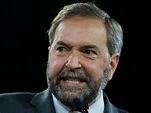Mulcair's ouster will have significant effect on NDP in B.C.
Ousted federal NDP leader Tom Mulcair.
The federal NDP, assembled in convention in Edmonton, did an unprecedented thing on Sunday. The delegates removed their party leader by a 52 to 48 per cent margin.
The loss of confidence in Tom Mulcair which culminated in the historic vote amounted to what National Post columnist Michael den Tandt calls a "day long execution." That's a pretty apt description.
While the federal party has been all but torn in half now, this vote will also have a devastating effect on the B.C. NDP, and on NDP provincial parties across the country. The first to be punished will be the Manitoba NDP, now in the midst of an election campaign. Incumbent Premier Greg Selinger (who barely survived a revolt against his leadership) and the party are down significantly in the polls. The Progressive Conservatives seem posed to win big when the Manitoba vote takes place on April 19.
In B.C., the next provincial election takes place in May, 2017. The two main parties, the BC Liberals and NDP, are already deep in preparations for that contest.
The BC Liberals should be vulnerable. They've been in office for 15 years and their age is showing at times. The main pledge from the 2013 contest, that B.C. would have LNG plants under construction by 2017, has yet to be fulfilled. There is considerable anger over the BC Liberals' indifference to the dramatic jump in housing prices in Greater Vancouver, and the party's fundraising efforts have come under a great deal of scrutiny.
However, even before Sunday's deposing of Mulcair, the B.C. NDP was having troubles. Some are similar to the undercurrents showing in Edmonton, between the ultra green wing who want to keep oil and natural gas in the ground, and those (led by Alberta premier Rachel Notley) who want to build pipelines and take advantage of natural resources, albeit with many more environmental safeguards in place.
B.C. NDP leader John Horgan has already come out against the BC Hydro Site C dam project, and most recently has opposed the largest LNG project still active, the Pacific NorthWest project near Prince Rupert. He has taken heat from some of his private sector union backers, who want the jobs those projects will create.
Now he will also be tripped up by the federal party's woes, as the NDP is one big party with provincial and federal arms all tied together constitutionally. The undecided voters that he must convince to vote NDP a year from now are extremely unlikely to be interested in much that he has to say.
Premier Christy Clark likely popped a few champagne corks after the news of Mulcair's ouster came out. Her chances of re-election went up significantly.
Update: Horgan has rebuked both the Leap Manifesto and some of the thinking behind it. See this article in The Globe and Mail. He needed to do that, and needs to keep doing that, in order to keep some of his supporters onside. Already, the BC Liberals are getting cheers at construction union gatherings, while the NDP is being roasted.
The almost even rupture of the NDP at the Edmonton convention may indeed foreshadow a troubled future for the party. If many of the union leaders who back resource development see the party taken over by the ultra-greens, they may stay involved, but their members will bolt. Meanwhile, the ultra greens, fuelled by the Leap Manifesto, may end up out of the party if the traditional unionists and more moderate NDP members reject their approach.
They could end up over at the Green Party, although much of their manifesto would be unacceptable there. The Green Party is much more middle of the road on economic development than the NDP is.
It wouldn't be fair to end this without a salute to Mulcair. He's been a very effective debater in the House of Commons, was a key factor in the NDP making a breakthrough in Quebec in the 2011 election, and has been a passionate and principled MP. It will be difficult, if not impossible, for the NDP to find as qualified a successor.
The federal NDP, assembled in convention in Edmonton, did an unprecedented thing on Sunday. The delegates removed their party leader by a 52 to 48 per cent margin.
The loss of confidence in Tom Mulcair which culminated in the historic vote amounted to what National Post columnist Michael den Tandt calls a "day long execution." That's a pretty apt description.
While the federal party has been all but torn in half now, this vote will also have a devastating effect on the B.C. NDP, and on NDP provincial parties across the country. The first to be punished will be the Manitoba NDP, now in the midst of an election campaign. Incumbent Premier Greg Selinger (who barely survived a revolt against his leadership) and the party are down significantly in the polls. The Progressive Conservatives seem posed to win big when the Manitoba vote takes place on April 19.
In B.C., the next provincial election takes place in May, 2017. The two main parties, the BC Liberals and NDP, are already deep in preparations for that contest.
The BC Liberals should be vulnerable. They've been in office for 15 years and their age is showing at times. The main pledge from the 2013 contest, that B.C. would have LNG plants under construction by 2017, has yet to be fulfilled. There is considerable anger over the BC Liberals' indifference to the dramatic jump in housing prices in Greater Vancouver, and the party's fundraising efforts have come under a great deal of scrutiny.
However, even before Sunday's deposing of Mulcair, the B.C. NDP was having troubles. Some are similar to the undercurrents showing in Edmonton, between the ultra green wing who want to keep oil and natural gas in the ground, and those (led by Alberta premier Rachel Notley) who want to build pipelines and take advantage of natural resources, albeit with many more environmental safeguards in place.
B.C. NDP leader John Horgan has already come out against the BC Hydro Site C dam project, and most recently has opposed the largest LNG project still active, the Pacific NorthWest project near Prince Rupert. He has taken heat from some of his private sector union backers, who want the jobs those projects will create.
Now he will also be tripped up by the federal party's woes, as the NDP is one big party with provincial and federal arms all tied together constitutionally. The undecided voters that he must convince to vote NDP a year from now are extremely unlikely to be interested in much that he has to say.
Premier Christy Clark likely popped a few champagne corks after the news of Mulcair's ouster came out. Her chances of re-election went up significantly.
Update: Horgan has rebuked both the Leap Manifesto and some of the thinking behind it. See this article in The Globe and Mail. He needed to do that, and needs to keep doing that, in order to keep some of his supporters onside. Already, the BC Liberals are getting cheers at construction union gatherings, while the NDP is being roasted.
The almost even rupture of the NDP at the Edmonton convention may indeed foreshadow a troubled future for the party. If many of the union leaders who back resource development see the party taken over by the ultra-greens, they may stay involved, but their members will bolt. Meanwhile, the ultra greens, fuelled by the Leap Manifesto, may end up out of the party if the traditional unionists and more moderate NDP members reject their approach.
They could end up over at the Green Party, although much of their manifesto would be unacceptable there. The Green Party is much more middle of the road on economic development than the NDP is.
It wouldn't be fair to end this without a salute to Mulcair. He's been a very effective debater in the House of Commons, was a key factor in the NDP making a breakthrough in Quebec in the 2011 election, and has been a passionate and principled MP. It will be difficult, if not impossible, for the NDP to find as qualified a successor.




Comments
Post a Comment